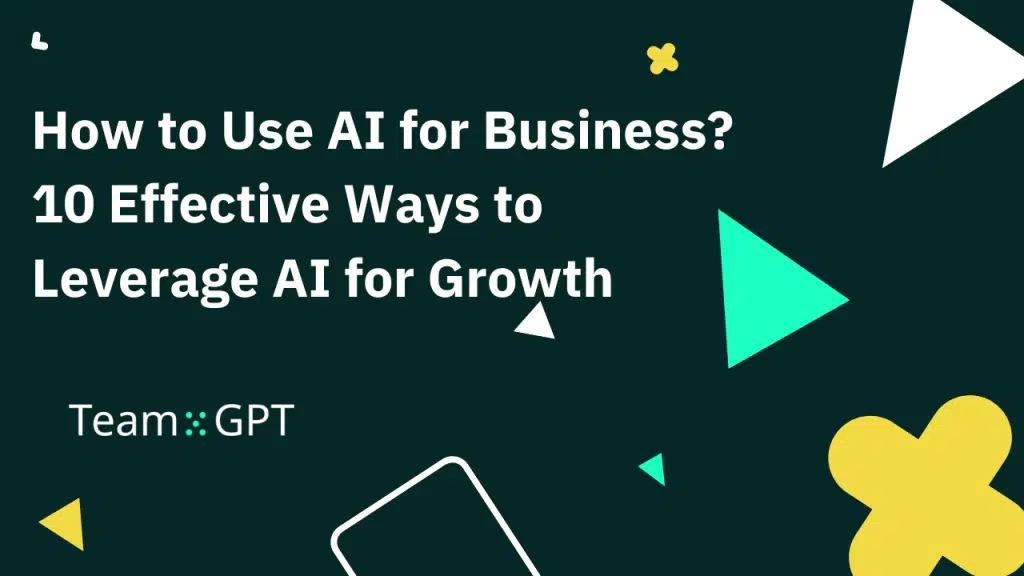The steady rise of Artificial Intelligence has made one thing perfectly clear.
You’ll either adopt innovation in time and thrive or keep lagging until the competition runs you over.
In this detailed guide, we’ll teach you how to use AI for business to ensure you’ll make the most of everything AI has to offer for long-term business success.
Before we begin, let’s quickly answer the essential question:
Table of contents
- Why Using AI for Business Is a Must in 2025?
- 1. Content Creation and SEO
- 2. Automating Routine Tasks
- 3. Helping Tailor Outreach to Your Audience
- 4. Streamlining Recruitment Processes and Employee Onboarding
- 5. Drafting Killer Sales and Marketing Strategies
- 6. Enhancing Sales with Predictive Analytics
- 7. Improved Analytics and Reporting
- 8. Delivering Improved Customer Experiences
- 9. Creating Bulletproof Cybersecurity Systems
- 10. Enhancing Decision-Making and Financial Planning
- The Future of AI in Business
Why Using AI for Business Is a Must in 2025?
As mentioned above, staying ahead of the innovation curve is vital to staying competitive.
Not jumping aboard the AI bandwagon would be the same as sticking to manual work at the dawn of industrialization – you simply wouldn’t be able to keep up with everyone else.
Even if we disregard the fact that using AI for business is rapidly gaining traction, the fact that AI can significantly improve efficiency and productivity remains one key reason for implementing it as soon as possible.
Namely, the development of advanced AI technologies, such as Machine Learning and Natural Language Processing – which enabled AI engines to learn, adapt, and understand human language and analyze more complex data sets with greater accuracy and precision – created plenty of new opportunities for using AI for business, including:
- Boosting efficiency.
- Enabling data-driven decision-making.
- Enhancing customer satisfaction.
- Improving financial planning, and many more.
Therefore, it’s no surprise that 82% of companies already use or trial AI in their businesses.
And judging by the current situation, the number of business AI users is only going to grow, with an expected annual growth rate of 37.3% between 2023 and 2030.
This means that the right time to start using AI for business is now – and we’re here to show you how.
So, let’s examine the ten most effective ways of leveraging AI for business growth and success in the era of digital transformation.
1. Content Creation and SEO
One of the first things to come to mind when you mention using AI for business is content creation.
With the rise of ChatGPT, JasperAI, and similar generative AI models, many businesses started using them to create all kinds of sales and marketing content, including:
- Ad copy.
- Social media posts.
- Blogs and articles.
- Website copy.
- Images and videos.
- Cold call scripts.
- Email copy, and more.
Leveraging AI to craft content has several essential business benefits, but the key one is that it lets you create more quality content in less time.
Namely, advanced AI engines can write long-form content such as blogs and guides in seconds, a fraction of the time it would take human writers for the same task.
This advantage alone directly results in an efficiency boost and cost reduction, making the entire content creation process more scalable and sustainable.
However, there are a few measures you must take to ensure that your AI-generated content will yield the results you want:
- Personalize it and perfectly tailor it to your target audience and desired outcome (e.g., converting MQLs to SQLs, closing sales, raising brand awareness).
- Make it more relatable and relevant by adding a human touch.
- Make sure it’s in line with SEO standards.
You can easily tick all these boxes in Team-GPT.
The AI collaboration platform enables your team to work together on content projects in real-time by harnessing various AI models to:
- Brainstorm ideas and concepts.
- Generate, refine, edit, and customize content.
- Ensure that each content piece is SEO optimized (i.e., includes relevant keywords, has optimized structure, etc.).
This way, you can leverage AI for that much-needed productivity boost while keeping actual humans in the loop during all the essential parts of the process, ensuring that your content will be unique, humanized, and valuable to your audience.
Here’s how you can write articles in about 3 minutes inside of Team-GPT alongside your team:
 Please accept statistics, marketing cookies to watch this video.
Please accept statistics, marketing cookies to watch this video. 2. Automating Routine Tasks
Automation has been widely used to streamline various business processes and operations for quite some time now, but with the rise of AI, this area was also revolutionized.
Namely, AI-driven task automation involves several different technologies, all of which play their part in increasing efficiency, reducing the possibility of error, and allowing you to save more money, including:
- Robotic Process Automation (RPA)—RPA tools, like Microsoft Power Automate, are ideal for repetitive, rule-based tasks like triggering notifications, data syncing between systems, providing email alerts, conducting document approvals, etc.
- Natural Language Processing (NLP)—NLP solutions like IBM Watson Natural Language Understanding are used for language-based tasks, such as providing customer support insights, social media monitoring, content analysis, and brand monitoring.
- Machine Learning Algorithms—ML algorithms can optimize tasks by learning from your data over time, making them perfect for predictive analytics, churn prediction, demand forecasting, recommendation systems, etc.
- Virtual Assistants—Tools like Amazon Alexa for Business can handle scheduling, task management, meeting summaries and transcriptions, and other repetitive tasks.
With the help of these AI models, you can automate simple, mundane tasks, like email categorization or sending follow-up emails, and more complex tasks, such as customer onboarding and lead qualification.
3. Helping Tailor Outreach to Your Audience
Did you know that 60% of consumers say they’ll become repeat customers after a personalized shopping experience?
This number alone speaks volumes about the importance of personalization in today’s business landscape, where everyone is competing to capture leads’ attention and persuade them their solution is the best choice.
AI can ensure that every sales and marketing tactic you devise and apply is perfectly tailored to your target audience, increasing the chances of getting quality leads and closing more deals by handling several critical processes:
- Audience segmentation—AI-powered tools like Segment and Optimove analyze vast amounts of customer data, identifying meaningful patterns and grouping audiences based on shared characteristics (e.g., demographics, behavior, purchase history, etc.). This provides distinct segments that you can target separately.
- Real-time personalization—Solutions like Monetate and Dynamic Yield can use data from a user’s current web session to make instant recommendations, such as suggesting products or articles based on what the user is viewing or adapting overall website content to their behavior.
- Optimizing outreach timing—By analyzing customer behavior patterns, AI-powered outreach tools like Brevo or Klaviyo can pinpoint the right time to reach out to each customer segment or lead and determine the best follow-up frequency.
4. Streamlining Recruitment Processes and Employee Onboarding
Growing your team is an exciting but also very taxing process.
Both recruiting and onboarding new employees are pretty intensive processes. They require lots of time and effort from your HR teams and eat your resources away before you know it.
AI can streamline at least some of the more routine processes related to recruitment and onboarding, relieving your HR and helping you find the perfect candidate more easily and integrate them into your team in no time.
For instance, you can leverage AI to:
- Improve candidate screening – AI-powered tools like HireVue can quickly scan resumes to identify relevant skills, qualifications, keywords, and experience, automatically shortlisting candidates who best match the job criteria.
- Automate onboarding – You can use various learning platforms, like Workday’s AI-powered tools, to monitor each new hire’s training progress and tailor training programs to their role, offering personalized onboarding paths that include interactive tutorials, compliance training, and quizzes.
Pro tip: You can also use Team-GPT to create fully personalized onboarding systems. Within the platform, you can create various interactive training programs, quizzes, and visuals that help new hires adapt to your organization more quickly.
Moreover, you can easily organize and collaborate on your training material, ensuring that it’s always fresh, reusable, and easily accessible by any team member who needs it.
5. Drafting Killer Sales and Marketing Strategies
Regardless of how good your sales and marketing teams are, sometimes you’ll face challenges devising efficient tactics for showcasing your product in the best possible light.
And that’s another area where AI can step in to save the day.
Although AI cannot replace human creativity and inventiveness, it can boost brainstorming sessions and offer new perspectives on situations that humans might easily overlook.
Namely, thanks to its ability to recognize patterns and identify anomalies, AI can help you create tailored marketing and sales strategies based on the data you feed into it and the prompt you give it.
For instance, you could use AI to suggest the best ways of penetrating a new market based on:
- Your product details – Its unique selling point, main use cases, pain points it solves, etc.
- ICP – Ideal Customer Profile, i.e., the type of persona most likely to be interested in your product based on their needs, issues, desires, preferences, etc.
- Target market – Geographic and demographic details, current trends, competitors, etc.
Within Team-GPT, you could take this process to a new level by having the entire team provide their unique insights, expertise, and opinions in real-time in one shared AI-powered chat.
This enables you to develop customized strategies that are perfect for your business goals and target market much more easily than if you used generic AI models or relied on human expertise alone.
Here’s how you can draft a business proposal in about 3 minutes using Team-GPT:
 Please accept statistics, marketing cookies to watch this video.
Please accept statistics, marketing cookies to watch this video. 6. Enhancing Sales with Predictive Analytics
Wouldn’t it be cool if you could look into the future and pinpoint exactly what your customers will need and be interested in so you can offer it to them when the time is right?
Well, with AI, you can get your own sales crystal ball, which can forecast market trends and predict customer behavior based on relevant historical data, allowing you to design a proactive approach and make the most of each possible opportunity.
Namely, ML algorithms are perfect for analyzing data like past customer interactions, purchase history, and engagement data to predict:
- Which leads are most likely to convert.
- Which customers may be ready for an upsell.
- Which might be at risk of churn.
So, for instance, if you’re a retail company, you can use a tool like Amazon Personalize to predict when a customer might be interested in a complementary product, such as accessories for a recent purchase, and proactively reach out with a custom-tailored offer.
This gives you a substantial competitive advantage, critical for success in today’s business landscape.
7. Improved Analytics and Reporting
Tracking KPIs and monitoring the performance of your campaigns and strategies is critical for efficiently reaching your business goals.
However, navigating large data volumes is far from easy, and it only gets progressively worse as your business grows.
Since AI excels at analyzing big data sets, it’s a dream cometrue for anyone wanting to make analytics and reporting easier, faster, and more insightful.
AI can automate both data collection and analysis, freeing your teams’ time and allowing them to focus on more pressing matters. For instance, tools like Alteryx automatically clean and integrate data sourced from various platforms, delivering ready, actionable insights for data scientists.
But that’s not all. Quality insights won’t do you much good if you get them too late. With AI-driven solutions, you can get real-time reporting. Team-GPT enables you to turn complex data into clear, easy-to-read reports, keeping decision-makers in the loop with insights that are as understandable as they are actionable.
This way, you’ll be empowered to make your data work for you—not the other way around.
8. Delivering Improved Customer Experiences
Delighting your customers by providing highly satisfying experiences with your brand across levels is one sure way to increase conversions, gain brand advocates, and boost loyalty.
However, dealing with people and their unique preferences, needs, moods, and expectations can be overwhelming, to say the least.
This is why your customer support and success professionals will be very grateful if you provide AI-powered assistance to deliver faster, more personalized, and genuinely engaging customer interactions.
One common way of doing this is by deploying AI-driven chatbots like Drift that can handle common inquiries 24/7, providing instant answers and freeing human agents for more complex issues.
This way, customers get quick, accurate responses without waiting on hold, which will surely earn your brand some valuable points in their eyes.
At the same time, tools like Salesforce Einstein analyze customer data to personalize every interaction. This means your customers will get:
- Better product recommendations.
- Tailored content.
- Offers that actually resonate with them.
The result? More happy customers, higher conversion and retention rates, and a stark increase in ROI.
9. Creating Bulletproof Cybersecurity Systems
While the digital revolution has introduced many benefits and amazing new opportunities, it has also created a whole new world of threats – cyber risks.
Criminals and scammers won’t think twice before trying to hack your system in search of financial or other sensitive data, meaning companies will need to step up their cybersecurity game.
AI can help with both anticipating and reacting to existing threats thanks to its ability to identify anomalies, making it a powerful ally in the struggle to keep your assets safe and sound.
Certain AI-powered threat detection tools, like Darktrace and CrowdStrike, continuously monitor network traffic, spotting suspicious activity as it happens.
These systems function by learning what “normal” looks like within a network, which allows them to recognize and flag anything unusual—whether it’s an unauthorized login attempt or a data exfiltration effort.
AI can also boost endpoint security. Platforms like Cylance use machine learning to identify and neutralize threats before they become active, analyzing files for malicious behavior without relying on traditional virus signs.
This proactive approach means malware and ransomware are stopped in their tracks, often before they’re even recognized by conventional antivirus programs, giving you a significant advantage over bad actors.
10. Enhancing Decision-Making and Financial Planning
AI could easily be the best financial advisor/business consultant you’ve ever had.
Thanks to its ability to analyze vast amounts of financial and other relevant data in real-time and convert it into actionable insights, AI is transforming business decision-making, helping you minimize risk and achieve optimal outcomes across levels.
For instance, predictive analytics tools like SAP Analytics Cloud and IBM Planning Analytics forecast revenue trends, model potential scenarios, and highlight the impact of various strategies.
As a result, you can explore “what-if” situations, from expanding into new markets to adjusting pricing models, and make informed decisions grounded in quality data.
You can also use it for budgeting and forecasting. Tools like Workday Adaptive Planning, for example, automate data collection and provide real-time updates, allowing you to react to market shifts faster and ensuring your plans stay relevant and actionable at all times.
The Future of AI in Business
When it comes to the future of AI in business, one thing is for sure: AI is here to stay.
Once you grasp the new opportunities and advantages of using AI for business needs and goals, there’s no going back to how it was before.
Being able to make sounder business decisions, nailing each sales and marketing strategy, and delivering outstanding customer experiences every single time significantly contribute to overall business success, and they’re just some of the many benefits of using AI in business.
So, if you’re looking to stay competitive for many years to come, your primary focus should be AI adoption—the sooner, the better.
If you’re unsure how to begin or simply want to harness AI’s optimal potential from the get-go, Team-GPT has got you covered.
With our platform, your entire team will be easily onboarded on any and every AI model you need with deployment on your own servers, enabling you to collaborate on, organize, and structure AI chats and projects as you see fit.
Sign up for Team-GPT’s free plan and discover how easy it is to fully implement AI with us.

Iliya Valchanov
Iliya teaches 1.4M students on the topics of AI, data science, and machine learning. He is a serial entrepreneur, who has co-founded Team-GPT, 3veta, and 365 Data Science. Iliya’s latest project, Team-GPT is helping companies like Maersk, EY, Charles Schwab, Johns Hopkins University, Yale University, Columbia University adopt AI in the most private and secure way.


